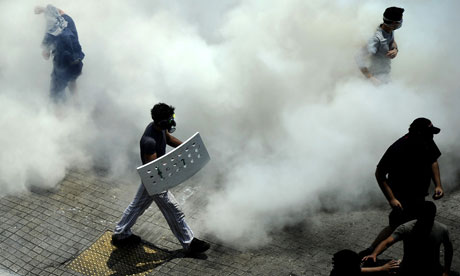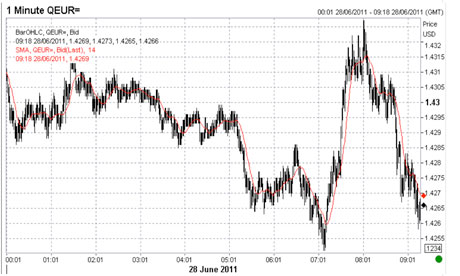I'm going to wrap up the blog for today now. Thanks for all your comments. All being well, I'll be live blogging events in Greece - including the crucial vote in parliament - tomorrow.
Here's a summary of events today:
• Tens of thousands of Greeks have taken to the streets to voice their opposition to a new wave of austerity measures which will be subject to a vote in parliament on Wednesday and Thursday. A two-day strike called by unions began today. Transport, schools and other services as well as many private businesses were shut as a result of the strike called by ADEDY, the union representing half a million civil servants and GSEE, which represents 2 million private sector workers. Hundreds of flights have been cancelled or rescheduled and protesters have blockaded the port of Piraeus.
• A minority of protesters were involved in running battles with the police. Many of them wore crash helmets or bandanas over their faces. They brandished wooden staves, hurled missiles including bricks and molotov cocktails and started fires. Two communications trucks were set on fire and shops were vandalised. The troublemakers, believed to consist mainly of anarchists, also threw smoke grenades and firecrackers. Police fired rounds of teargas leaving the air in central Athens acrid. Police said 18 people were detained, with formal arrest charges laid against five of them, and that four policemen were injured and transferred to a military hospital. There were reports of dozens of people being treated for the effects of teargas in Syntagma Square, which has been the focal point of the protests.
Here are some responses to our request for answers to the question as to whether the Greek parliament should accept the government's proposed mid-term bill - designed to meet the concerns of international lenders - and also for you to tell us your suggested alternative solutions.
From Twitter, @eF_daemon, in Athens:

Mid-Term Bill is about saving the banks economy by killing people's economy. we have to be victims or irrational to accept @Haroon_Siddique
Olli Rehn [EU Commissioner] blackmails GR people to pay a bill that bankers and politicians created. Is that high European ideal? #Greece @Haroon_Siddique
From the comments section:
Begin transparent exploitation of natural resources immediately. Forbid Yanks, French and Germans from getting involved as there is a huge conflict of interest and they are also prone to corruption (Enron, Siemens, etc).
A messy default is the absolute worst thing that can happen. I have already seen clashes between the xrusavgites and the immigrants...a messy default will only intensify this.
...
Rather than cut wages and increase taxes...privatisation and opening up the economy. For that to happen we need an economy, these austerity measures most likely won't help...but I understand that they must be passed. We need to look forward...an efficient public sector, break up the monopolies, reduce government regulation and the opening of all these closed professions. That would be a good start. And then they can work towards disbanding these terrorist trade unions and making use of the vast natural resources this country has. And finally...transparency.
While I agree in principle with scorcho, I have seen the effect of privatisation - just look at Britain. Out of control and largely unregulated fuel industry who have now become so big, that no ombudsman has the balls or will to truly take them to task.
Regulation and transparency should be made cardinal rules, whatever we end up doing.
My colleague Laura Oliver has unearthed some video of the clashes.
This one shows people with their faces covered, carrying wooden staves, hurling projectiles at police. They attack a McDonalds and set bins and restaurant sun umbrellas on fire. Police are seen firing teargas.
A more jerky video posted on YouTube shows similar scenes, along with a gentleman who appears to be a man of the cloth walking through the midst of the chaos (1m 20s in), attempting to cover his face against the teargas.
_
John M, he did not want his full name used, has emailed from Greece. He says he intends to go to Syntagma Square tomorrow to coincide with the vote. He writes about what Greece is like for a young person and what he thinks the solution is:

I'm a member of the so-called 'lost generation. And by that, I don't mean that I am unemployed, or starving, yet things are quite hard for youths right now. Myself, I am paying off a bank loan used for studying, and some bills - but I begun working as a graduate in fall 2008, exactly when the financial crisis begun to show its ugly head worldwide ...The norm, in many private sector companies, including the one I work in, is to get paid with delays. One month unpaid is considered "lucky", two months is "common", three+ is becoming more and more commonplace.
As to what should the government do? They should vote for the mid-term plan, but only marginally, and noting the public discontent on the street. This will appease the creditors, however it will have them thinking that they can't ignore the elephant in the room for much longer: Greece needs growth, not choking, if they are to get their money back. The sooner they guarantee / establish growth, the sooner they'll see GDP rising, debt-to-GDP falling, and everything going as it should. Reducing GDP brutally within a couple of years will not work, it never has in any similar schemes.
The politicians must clearly illustrate a long-term plan out of the crisis, and cut down on their own benefits as well - Being a politician should only mean you're a well paid state employee, not a guy with minimum yearly income of about 90-100k Euros in a country where the majority of the tax base is in below 40k.
The Associated Press reports that 18 people have been detained, with formal arrest charges made against five of them, and that four policemen have been injured and transferred to a military hospital.
Reuters says that the "TV trucks set on fire" by protesters (see 3.18pm) were actually "two communications trucks with mobile telecoms transmitters which they had apparently mistaken for TV trucks and sprayed with slogans attacking the media and banks".
I just spoke to the Guardian's Helena Smith in Athens who said the "air is absolutely thick with these acrid plumes of teargas":
The centre of Athens has turned into battlefield. Riot police have been fighting pitched battles with protesters. The protesters are young, hooded Greeks, almost vigilantes. They are not the demonstrators who peacefully took to the streets in mass rallies organised by trade unions here earlier in the day.These are young kids...throwing stones, marble slabs, rocks, ripping up pavements, anything they can get hold of, any projectile to lob at riot police who of course have now become the hated symbol of the government's hated austerity measures.
Most of the protesters are blaming the police for overreacting to these violent incidents and to these violent incidences and to these young kids who are troublemakers, who are known in Greece as 'the known unknowns'. Everybody sort of knows who they are, there is a well known profile of the self-described anarchists who hide their faces either with hoods or banners or crash helmets with the sole purpose of causing mayhem usually at the tail end of a demonstration. This has been going on ever since the Greek debt crisis erupted 18 months ago.
I've just been talking to a unionist here, a teacher who told me that he saw it [the police crackdown] as part of a greater plan to clear the square of demonstrators in the hours leading up to a vote.
There is a Guardian gallery of pictures from today's protests.
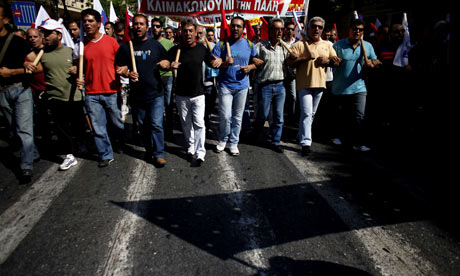 Protesters march toward the Greek parliament in Athens. Photograph: Angelos Tzortzinis/AFP/Getty Images
Protesters march toward the Greek parliament in Athens. Photograph: Angelos Tzortzinis/AFP/Getty Images
_
TV pictures show protesters attempting to march back into Syntagma Square.
Some of them, in black are throwing missiles and police are replying with teargas.
Zoe Lanara, from the general confederation of Greek workers, one of the unions that called the strikes, tells the BBC the scenes are "terribly distressing."
She says she thinks "the [austerity] plan will go through but this will not be the end of Greece's troubles".
A TV satellite truck has been set on fire, the second that has been set on fire today.
Police let off stun grenades to allow firefighters to get to the van.
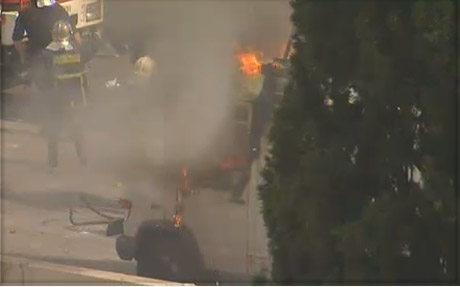
_
Some tweets from on the ground in Greece:
Tony Connelly, from RTE News:

#Syntagma returning to stability, but bloodied, bruised and angry. Riot police keeping a distance, as yet another demo enters the square
Alexander Marquardt, from ABC News:

Police aggressive w media too, pushed us up against wall and ripped off gas masks in middle of tear gas cloud. #Greece
@duke_zappa (translated by @cyberela)

via @duke_zappa 60 ppl with at first aid station with breathing problems (from tear gas) #28jgr #syntagma #rbnews
_biglebo_ (translated by @iptamenos33)

TR @_biglebo_ : There are well over 1000 reasons to cry in this country, but I refuse to cry because of teargas. #syntagma #J28Gr
endiaferon has some high quality pictures on Flickr of the protests including of people in a sit-down protest at Syntagma Square, trying to prevent police entering.
Three police officers were injured by flying stones and one person was stabbed during fights between rival groups of young demonstrators, according to Reuters. Police also said three people were treated for breathing difficulties.
Afrodite Xigorou, in Greece, tweets:

@guardian @haroon_siddique Amazing courageous young people standing in front of police clapping and singing while field is full of teargas.
The Guardian's Helena Smith, in Athens, writes that Syntagma Square, the focal point of the protests, has been abandoned by most people after heavy use of teargas by the police :
There has been more teargas fired than at any other protest. Riot police who usually responded with the stuff only after being taunted and targeted themselves after firing off rounds of it. For first time, in the 18 months since debt crisis erupted, they have managed to move protesters out of Syntagma Square by filling it with teargas.
Demonstrators are fleeing the square, making their way towards the ornate buildings of
Athens University on Panepistimiou Avenue ... only the most hardy have stayed on. There are reports of many suffering respiratory problems because so much teargas has been fired.
Here's a summary of events in Greece so far today.
• Hundreds of thousands of Greeks have taken to the streets to voice their opposition to a new wave of austerity measures which will be subject to a vote in parliament on Wednesday and Thursday. A two-day strike called by unions began today. Hundreds of flights have been cancelled or rescheduled and protesters have blockaded the port of Piraeus.
• There have been clashes outside the finance ministry in Athens between a minority of protesters and riot police. Protesters, many of them wearing crash helmets or scarves over their faces hurled missiles including bricks and started fires. They also threw smoke grenades and firecrackers. Police responded by firing teargas.
• The Greek secretary general for privatisations told the British-Hellenic Chamber of Commerce annual conference that the government plans to sell assets in the next four years to raise €50bn.
In the comments section there has been some debate about the rights and wrongs of a new set of austerity measures.
I live here ... I know what happened to poor and ordinary people in the Argentine and Russian defaults. Most Greeks appear to have no idea about the grim realities of a default. Most of their rabble rousing politicians have not told them, nor their unions.. And many Greeks are sleep walking into dire dire poverty, which will make austerity look like the lap of luxury.
It's hard to be a teacher nurse or whatever and lose 25% of your pay. But it will be much harder if its 100% and for god knows how long and when it does come back unlikely to be more than 50% of what it was.
I don't understand why they don't get what a default means... no money at all!
GataFuriosa in Greece responds:
Kizbot, we have no problem with austerity, as long as it applies to everybody. As you know, even more taxes are coming down to our heads, while our government does absolutely nothing to make the rich/ freelancers pay what they are due.
In addition, no one, NOT EVEN one of the hundreds, possibly thousands that stole EU and Greek taxpayer hard earned money, was put behind bars.So, what actually happens now is : a) No one has been punished for this mess we are in, nor do we see any intention towards that direction b) The Greek state, unable or unwilling to impose taxes to the rich, taxes us even more. And this policy is clearly killing the greek market, whereas the rich maintain their earnings and their standard of living, with their untaxed money quietly sitting in a swiss bank.
So, under these circumstances, no, we do not want the 5th tranche, because we clearly cannot give it back.
It is clear that Greek debt will have to be restructured because it cannot pay it back. But a disorderly default now is suicidal. What are we going to eat?
I agree that the evaders and the corrupt must be chased down. It is vital as part of a sea change in Greek culture and politics. But it cannot happen today. It's just silly to cut your nose off to spite your face simply because you cannot get what you want today.
I've stocked up a bit on foodstuffs, but I'm going to get some more in the next few days. If the banks go down and all pay stops, I don't know what I'll do? Head for the country? My bloke has his family in Corfu. Athens will be terribly difficult.
Anyone who is in Greece/at the protests please get in touch to let us know how the austerity measures are affecting you/what you are seeing on the streets.
We would also like to hear your views on what Greece's next steps should be? Should the parliament pass the austerity measures? If not, what is the alternative?
You can use the comments section below, email me on haroon.siddique@guardian.co.uk or contact me via Twitter @Haroon_Siddique.
The Associated Press reports on the clashes in Athens:
Riot police fired tear gas at youths hurling rocks near the Greek finance ministry Tuesday, trying to quell the anger unleashed by a general strike as parliament debated new cost-cutting measures.
Hooded youths ripped up paving stones and set trash bins on fire in central Athens as police gave chase and fired tear gas and stun grenades. Earlier, about 20,000 people had marched peacefully in two separate demonstrations, while another 7,000 protested in the northern city of Thessaloniki without incident.
Everyone from doctors and ambulance drivers to casino workers and even actors at a state-funded theatre were joining the strike or holding work stoppages for several hours.
Hundreds of flights were cancelled or rescheduled as air traffic controllers walked off the job for four hours in the morning and were holding another walkout in the evening. Strikes by public transport workers snarled traffic across the capital, while other protesters blockaded the port of Piraeus.
Television pictures show small fires in Athens and rounds of teargas being fired in response by the authorities. Missiles are being thrown at the police and some people are trying to break windows. Some of those involved in the clashes have crash helmets on, some have bandanas over their faces.
The BBC's Jon Sopel estimates that hundreds are involved in the clashes, while hundreds of thousands are taking part in the demonstrations.
CNN's team may have run into some trouble.
@RAGreeneCNN

Concerned about our CNN team in #Greece. They may have run afoul of demonstrators. Fingers crossed
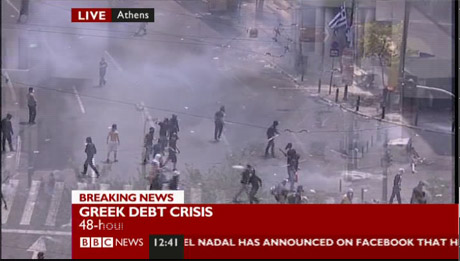
_
The Wall Street Journal reports on what it calls Greece's "epic yard sale".
For the taking: four wide-body Airbus jets, a state lottery, a state horse-racing concession and sports book, stakes in a casino, several ports, a national post office, two water companies, a nickel miner and smelter, a munitions maker, electricity and gas monopolies, a telecommunications operator, shares in a half dozen banks, hundreds of miles of roads, a defunct airport, old Olympic venues and thousands of acres of land, including magnificent stretches of Greece's famed coast ...But finding buyers for that grab bag of assets is likely to be a very tall order. Obstacles abound, including unions hostile to selling state-owned companies, citizens opposed to the privatization of state-owned land and a bureaucratic labyrinth that has long thwarted would-be developers.
To make matters worse, many of the available properties have already been offered for years, with no takers. Since 2000, Greece has netted some €10 billion [£8.9bn] from privatisation. Now it must do five times that much in less than half the time.
The BBC's Jon Sopel reports that the mood in Athens has changed in the last few minutes with firecrackers and smoke grenades going off. He says there are anarchists dressed in black, wearing crash helmets and holding wooden staves.
The authorities have responded with teargas, says Sopel, who is almost overwhelmed by the teargas, despite being eight storeys up from Syntagma Square.
My colleague Graeme Wearden has outlined the key dates that could see Greece descend into default:
Wednesday 29 June
The Greek parliament will vote on the austerity bill. Protesters plan to demonstrate in Klafthmonos Square.
Thursday 30 June
A second vote is scheduled on an enabling bill that will allow the government to implement austerity measures more rapidly than before. This will only take place if the government wins Wednesday's ballot.
Sunday 3 July
Eurozone finance ministers will gather at an extraordinary meeting to discuss the details of a second support package for Greece. They could approve the €12bn (£10.6bn) tranche of aid due under the initial bailout.
Monday 11 July
A full meeting of finance ministers from across Europe, with Greece top of the agenda.
Friday 15 July
Greece must repay €2.4bn of debt and could default if it has not received the €12bn aid tranche.
Tuesday 19 July
Another €900m of debt must be repaid …
Wednesday 20 July
... closely followed by another €1.5bn...
Friday 22 July
... with another €1.6bn due.
Another timeline by Graeme goes back to 2001 to track the origins of the current crisis.
The Economist's Megan Greene is at the British-Hellenic Chamber of Commerce (see 10.35am)where privatisation of Greek assets is the main point of discussion. She tweets:

Around half of #Greek privatization plan concerns real estate. W/o reliable land registry, I'm dubious the Greek govt will hit targets #bhcc
My colleague Graeme Wearden has been watching the reaction of the markets to the Greek crisis. He writes:
In the City, hope is narrowly winning the battle against fear, with the FTSE 100 up by a modest 11 points this morning at 5733. Traders say they are cautiously optimistic that the Greek government will win Wednesday's vote over the austerity package. There are also signs that a plan developed by the French banks to roll over some Greek debt is gaining ground.
"Optimism is growing that with the wolves at Greece's gates, Europe is uniting at the right time to help the country avoid a default that could send shockwaves throughout the rest of the eurozone," said Giles Watts, head of equities at City Index.
Euro against the dollar, 28 June 2011 Photograph: Reuters
The euro has been pretty volatile though. As our graph (with timings in GMT) shows, it strengthened against the dollar around 8.30am amid speculation that EU leaders were developing a contingency plan for Greece. But an hour later it fell back just as sharply, after the cost of insuring Greek debt jumped overnight. Not massive moves, but a sign of the jittery state of the markets.
Pavlos Antonopoulos, a schoolteacher on the protest march in Athens, told the Guardian's Helena Smith:
We want to demonstrate peacefully but we also want to ram the message home that that what is being asked of us after a year of unprecedented austerity is absolutely unacceptable.
I have lost 25% of my earnings and now I am being told that I am about to lose more. It would be better if Greece left the EU, gave up the euro and returned to [its old currency] the drachma. The average Greek is not to blame for this debt and that's why one of our main demands is that it should be written off.
 Photograph: Chris Ratcliffe/Bloomberg via Getty Images
Photograph: Chris Ratcliffe/Bloomberg via Getty Images
My colleague, political blogger Andrew Sparrow, has been covering comments on Greece by the governor of the Bank of England, Mervyn King.
King has warned that "buying time" in Greece (which is seen by some as a fair description of the EU's latest bailout plan) will not provide a long-term solution, Andrew writes. Giving evidence to the Commons Treasury committee, King said:
Buying time appears attractive very often, because the immediate crisis appears to go away. They will get to bed earlier. They relax more. But in fact if the underlying problems have not changed, the crisis comes back in an even more severe form. And that has been the case right through the past 18 months in trying to deal with Greece, Portugal and Ireland, and indeed in the problems for the euro area as a whole, which is why I say that there are dangers in just buying time, because if you forget the problem and say 'well thank goodness, that's gone away for a few weeks', that could be a very dangerous attitude of mind.

The Guardian's Aditya Chakrabortty wrote a piece earlier this month, well worth revisiting, on how Syntagma Square is on the frontline of European austerity protests.
On this square just below the Greek parliament and ringed by flashy hotels, thousands sit through speech after speech. Old-time socialists, American economists just passing through, members of the crowd: they each get three minutes with the mic, and most of them use the time alternatively to slag off the politicians and to egg on their fellow protesters ...
This is an odd alloy of earnestness and pantomime, to be sure, but it's something else too: Syntagma Square has become the new frontline of the battle against European austerity. And as prime minister George Papandreou battles first to keep his own job, and then to win MPs' support for the most extreme package of spending cuts, tax rises and privatisations ever faced by any developed country, what happens between this square and the parliament matters for the rest of the eurozone.
The banner wavers here know this. In the age of TV satellite vans and YouTube, they paint signs and coin slogans with half an eye on the export market. Papandreou's face is plastered over placards that congratulate him in English for being "Goldman Sachs' employee of the year". Flags jibe at the rive gauche: "The French are sleeping – they're dreaming of '68."
There is a livestream from Syntagma Square, the focus of the protests, on the Daily Motion website.
_
The annual conference of the British-Hellenic Chamber of Commerce is taking place in the grand surroundings of Claridge's in central London and this year the title given to the meeting is "Reforming hell as a challenge". 12.31 Update: As someone has pointed out this is a play on words of Hellas, an alternative name for Greece.
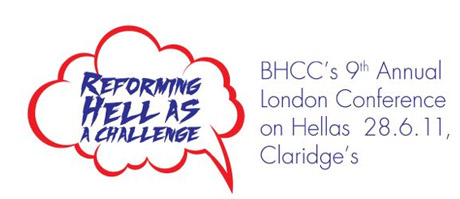 Screengrab from www.bhcc.gr
Screengrab from www.bhcc.gr
Up for discussion at the conference is the privatisation of a wealth of Greek assets.
Greek journalist Matina Stevis is tweeting from the conference:
G Christodoulakis, sec gen for privatisations takes the floor on #bhcc to talk about the plan to sell assets in next 4 yrs to raise 50b euro
Protesters are expected to fill the streets of central Athens today at the start of a 48-hour general strike aimed at stopping the Greek parliament passing austerity measures demanded by international lenders as the price for more financial aid.
Votes on the measures are due to take place on Wednesday and Thursday but the trade unions have threatened to storm parliament and physically prevent the ballot from being held.
ADEDY, the public sector union represents half a million civil servants and GSEE represents 2 million private sector workers. Some demonstrators have camped out in Syntagma Square, next to the parliament.
More than 5,000 police are being deployed to guard the centre of the capital, including parliament. With previous demonstrations having degenerated into riots, there are fears the same could happen again.
I just spoke to the Guardian's Helena Smith who has been out on the streets of Athens this morning. She said:
Greek unions are basically hoping to highlight the mass opposition towards these deeply unpopular austerity measure here in Greece by taking to the streets in vast numbers today ahead of the crucial vote on the new wave of measures in the Greek parliament tomorrow. The hope is that they can really bring the message home that these measures are not going to pass, that they have brought ordinary Greeks to their knees, that after a year of stringent wage cuts, pension cuts, benefit losses, Greeks cannot survive with further cuts. We mustn't forget that around 25% of the entire population here in Greece is now living below the poverty line.
I was in Syntagma Square, which has been the focal point of protests. Hundreds of protesters were streaming into the square but there was by no means the thousands of protesters we have seen in evening rallies. That is because there is a sort of ritual to Greek demonstrations. Protesters, usually unionists, hardcore unionists, tend to start rallies, take to the streets in the early morning, then they are joined by thousands of others who make their way in from across Athens.
The streets are full of riot police, helmeted, pistols, that sort of thing. The Greek government is quite nervous about the next tow days and has deployed up to 5,000 riot police in the city centre, mostly to avert the parliament building literally being stormed. Unions have vowed to stop lawmakers from entering the Greek parliament in Syntagma Square to they can physically stop the vote on these highly contentious austerity measures going ahead.

